Technology
Can AI Chatbots Become Your Therapist?
Published
2 years agoon
By
Skylar Lee
Mental health chatbots have become reliable companions for those who can’t afford therapy. However, these chatbots aren’t a real replacement for actual therapists. They can provide temporary comfort and aid mental health professionals in tracking patients’ moods and other necessary information to provide quality care. But with AI being more accessible and free, especially to teens, will more people depend on AI chatbots in the future?
The Latest in AI Chatbot & Mental Health

Mental health chatbots are on the rise. Wysa and Woebot are two well-known examples. But, one AI chatbot is much more popular than the others: the Psychologist bot on Character.ai. According to the BBC, Character.ai helps millions of users talk to the bot and other mental health-related ones to address any concerns.
Character.ai allows users to create bots to help others talk to their favorite characters or “individuals.” So far, the Psychologist and other mental health-adjacent bots have received millions of messages from multiple users. Character.ai users have shared their reviews on the social media forum Reddit about their experiences with the bot. So far, the bot has received nothing but amazing reviews.
For instance, one user messaged Psychologist to help with relationship issues and to communicate with their partner.
There’s one person to thank for this: Blazeman98. He hoped to help others because he wanted someone to talk to when his friends weren’t available. But this isn’t the only AI chatbot internet users can approach for their mental health concerns.
Other Mental Health Chatbots
Woebot is one well-known mental health chatbot. The team behind the chatbot uses cognitive behavioral techniques to help users talk about their feelings, and the chatbot will respond with compassion. Plus, it can give simple solutions to get you through the moment. It covers multiple mental health issues like needs, feeling capable, relationships, coping, and more. The chatbot helps adults, adolescents, and mothers. You can download Woebot in the App Store or Google Play Store.
If you have anxiety, depression, borderline personality disorders, and other mental health concerns, you can download Youper. This chatbot helps you track your moods every day. Plus, you can chat with the bot anytime you need help.
Wysa is another option to consider if you want an alternative to Character.ai. However, Wysa is ideal for businesses prioritizing mental health in the workplace. The chatbot helps the patient talk about what’s worrying them. Plus, it checks in with the patient and suggests exercises to improve their well-being. However, Wysa can connect patients to professionals.
Addressing Loneliness
Since AI chatbots don’t have any certification or accreditation to give advice or provide counseling, AI chatbots are excellent companions for lonely people. Meta-Gallup reports that a quarter of the global population feels lonely. With the rise of AI, more people can rely on AI to talk to them and provide companionship that others can’t offer, whether in real life or on the internet.
However, Business Insider writer Daniel Cox believes that more people will be lonely as they talk to AI often. It’s all because of the lack of human connection. Gen Z, in particular, will feel this loneliness even more so. Since they grew up with technology, talking to chatbots is a pathway for them when they need someone to talk to when they don’t have anyone else or because of the potential harm social media brings to users.
How Safe is it to Use AI Chatbots?

Although you can talk to an AI chatbot with the touch of a button, it could be risky to depend on an AI chatbot for mental health-related issues or companionship.
One issue that arises when talking to AI chatbots is your privacy. One recent example of a data leak comes from Microsoft when an employee unknowingly leaked 38TB (that’s right, terabytes) of data. That’s a possibility, especially if data isn’t stored properly. Or, in the employee’s case, they posted the wrong URL.
Another issue that comes up is bias and discrimination. For instance, one chatbot was taken down for the language it used while conversing with users on Twitter. Due to the unfortunate incident, it was forced to shut down because of an uncoordinated attack.
The chatbots mentioned above ensure safety and security through data encryption. Plus, they use language that won’t trigger or encourage users to harm themselves or someone else. Additionally, chatbots avoid giving diagnoses and aren’t discriminatory or biased. Moreover, some AI chatbots are HIPAA-compliant, ensuring they follow regulatory health standards. Finally, the chatbots won’t sell your data to third-party or advertising companies.
Final Thoughts
AI chatbots can be a companion when you’re lonely or need to discuss mental health conditions or symptoms. However, they are not a full replacement for a human therapist as they can only provide solutions to help you get through the moment, track your moods, and give you insights.
Character.ai provides a free solution to talk to a “Psychologist” bot anytime, but note that you’re not talking to a professional. If that’s bothersome for you, you can use other mental health chatbots to direct you to the help you need. This way, you’ll also have a safe and secure experience while conversing with chatbots built by professionals.
You may like
Business
How Marketing Optimization Tools Level Up Your Marketing Game
Published
5 days agoon
December 12, 2025By
Skylar Lee
While many companies and small businesses struggle to capture their target audience’s attention amidst competition from giant brands, it’s clear that marketing needs to be taken up a notch. To do this, it requires marketing optimization tools to not only achieve marketing objectives but also generate leads. But how do you go about optimizing your marketing efforts and what tools can help?
1. Make Use of Data

According to Hubspot, marketing in 2025 will heavily focus on data. That said, data will give you insights into your target audience. Plus, you can better understand how your business works better through data. Fortunately, many marketing optimization tools have data and analytics to help you reach targets.
If your strategy is understanding your audience better through data, Google Analytics is your best free option. With Google Analytics, you’ll know where your users are coming from and how many of them are visiting your website.
Another data-heavy strategy is social media marketing. After all, you don’t want your social media marketing efforts to go in vain. Although MeetEdgar is primarily a social media scheduler, it will help you understand which of your posts are doing great in engagement. Plus, you can make decisions regarding your other non-performing posts.
2. Focus on SEO
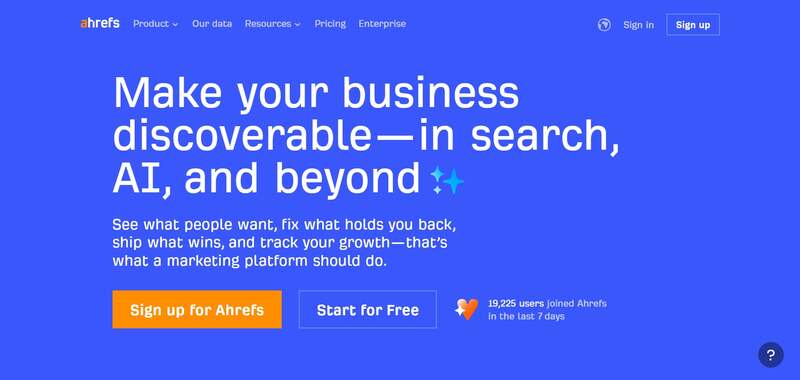
Data isn’t enough when optimizing your marketing campaigns or strategies. Marketing strategies are best served with the help of SEO. You shouldn’t overlook or underestimate the impact of what SEO can do for your business. After all, you want to drive customers to your website, right? SEO is your best bet in getting more clicks and visits. Plus, you can earn your place on the coveted first page of search engines.
With SEO, you don’t have to overcomplicate it. Plus, you don’t want to skimp on SEO, especially if you want visitors to flock to your site. You can use one simple tool to help you research keywords, explore your competitors, and track your progress. Ahrefs is one of the tools you should have in your arsenal. They have an all-in-one tool ready to help you learn about your content, links, competitors, and more!
3. Stay Active on Social Media

Social media platforms are the best places to reach your target audience. You can post on Facebook, Instagram, Twitter, and TikTok to engage with your audience and promote your products or services. But posting on social media requires constant efforts and well-thought-out strategies. You need to post regularly with the right content, copy, and visuals to attract your target audience. Content creation tools like graphic design software and video editors will help you meet your social media marketing goals.
Canva is the go-to for many marketers because of its ease of use and UI. Plus, you can make graphics in minutes. Meanwhile, Clipchamp is a trusted name in video editing. Marketers can use templates to create videos in a snap. Plus, they can make compelling videos by adding filters and AI voiceovers.
4. Keep Content Consistent
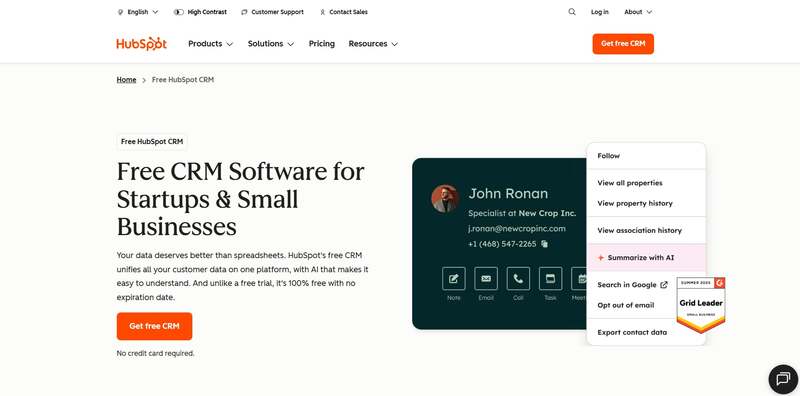
During the planning stages, it’s important that your content should also be ready before it’s published. If you are launching a marketing campaign, you need your visual assets and marketing copy prepared. But you don’t create for creation’s sake. You need to keep your messaging and visuals consistent on every platform.
You want to ensure that people across various channels view and interact with your campaign assets while getting your main message out.
There are a couple of marketing optimization tools for this strategy:
- Hubspot is the popular choice for content marketing since you can publish and schedule your blogs on this platform.
- Like with social media marketing, you need content creation tools. However, an alternative to content creation tools is unlimited graphic design and video editing services. For graphic design, you can rely on Penji. You can request your graphics in one place while you work on your company. Meanwhile, Video Husky is a trusted video editing service helping you with short-form and long-form videos.
- Email marketing is another content strategy you should consider when reaching your audiences. Mailerlite is your best bet in achieving your email marketing goals.
5. Research Your Competitors
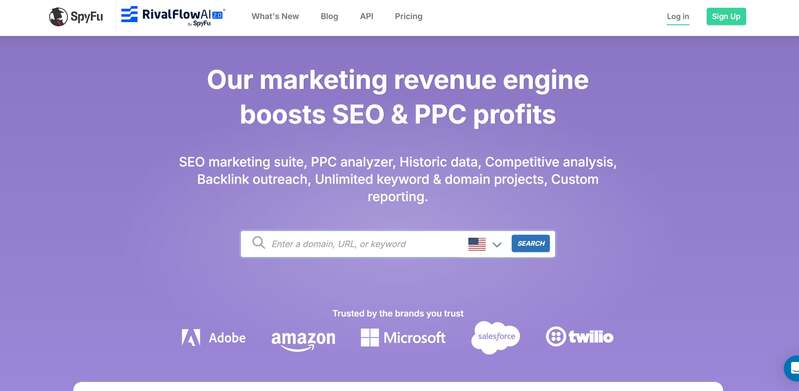
Aside from learning about your audience, you should also keep an eye out for your competitors. After all, you want to see how your target audience responds to their posts. Plus, you want to compare how different your websites could be. This will give you an idea of how to improve your posts and websites.
Although Ahrefs has a competitor research tool, an alternative to this is SpyFu. They specialize in analyzing competitor keywords, traffic, ads, and domains.
Other Marketing Optimization Tools to Use:
Marketing Automation
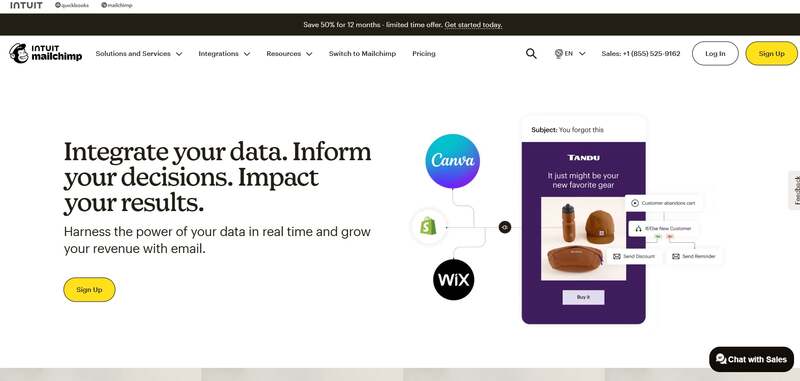
Marketing automation tools have been the go-to applications for most marketers. After all, marketing automation streamlines your work. Plus, you can leave it to the AI or other automated sequences to do your job for you. That said, there are tons of marketing automation tools.
One stands out from the rest, and that is MailChimp. Although known as an email marketing tool, they have a marketing automation feature by building relationships with your customers and ad retargeting.
Customer Relationship Management
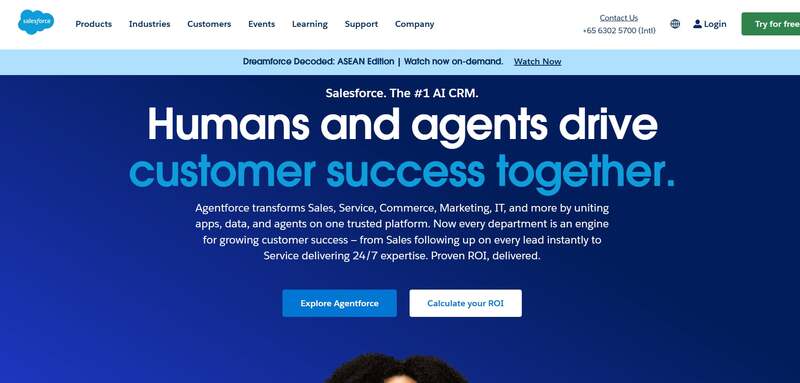
Customer relationship management (CRM) software is one tool you need to reach more customers. This works best if you have an email marketing strategy. And if you need a CRM tool, Salesforce is the highly recommended one. You can run your marketing campaigns on their software. Plus, you can nurture leads and provide the best customer experience.
Project Management
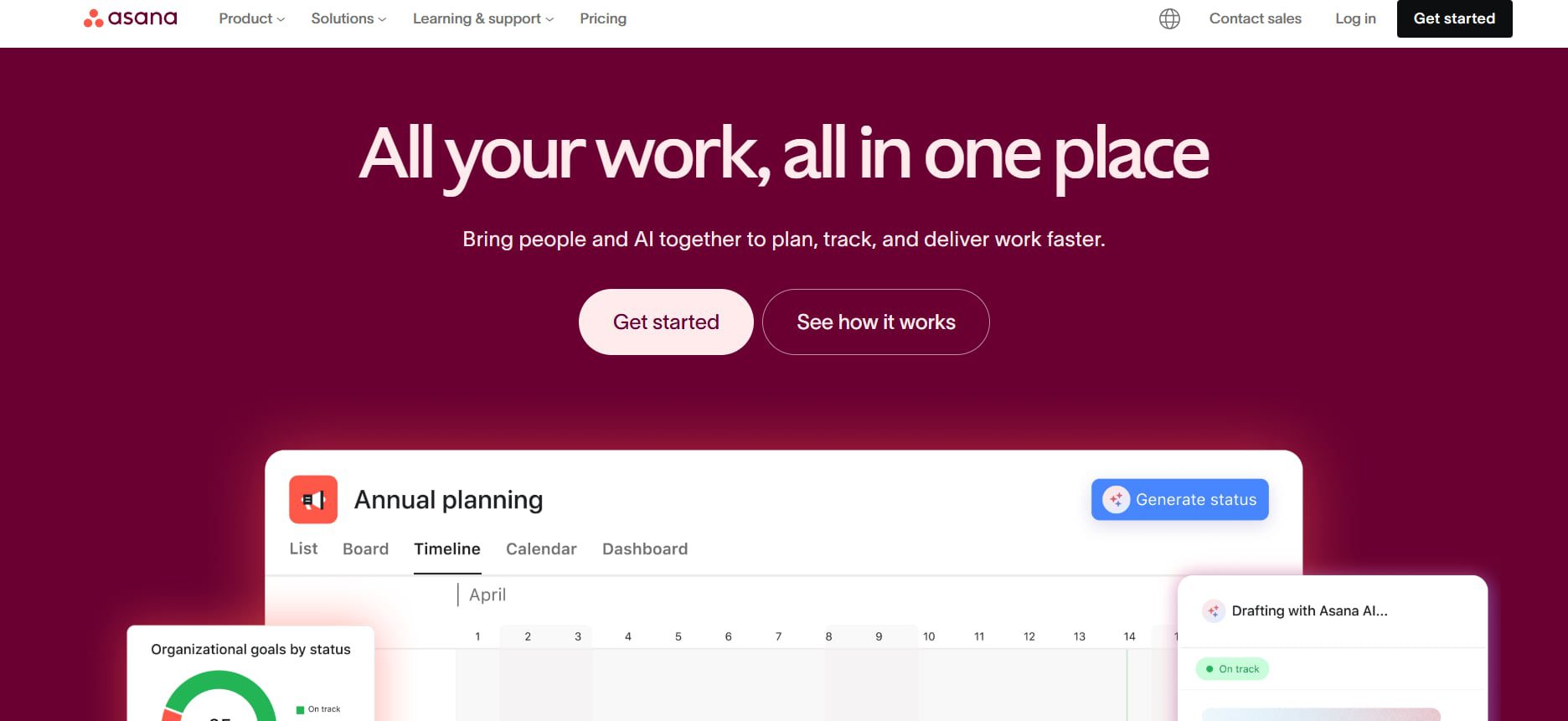
One overlooked marketing optimization tool is project management. You should use a project management tool to help you get on track with your campaigns. Asana is a must-subscribe project management tool for marketing. You can collaborate with your teammates, assign them various projects, and organize them for each strategy.
Final Thoughts
In the competitive landscape of 2026, optimizing your marketing strategy is no longer optional, it’s essential. It can be challenging to entice your target audience digitally nowadays, especially if you’re hesitant to use optimization tools. That’s why it’s essential to use them to help you achieve your marketing goals. And with the tools above, you can be on your way to reaching your audience and increasing your sales.

Are you looking to create a stunning presentation that keeps your audience engaged? It would be best if you had excellent presentation software to take your slides to new heights. Let’s review the ten best presentation software in 2026 so you can choose the best for your business.
1. Visme
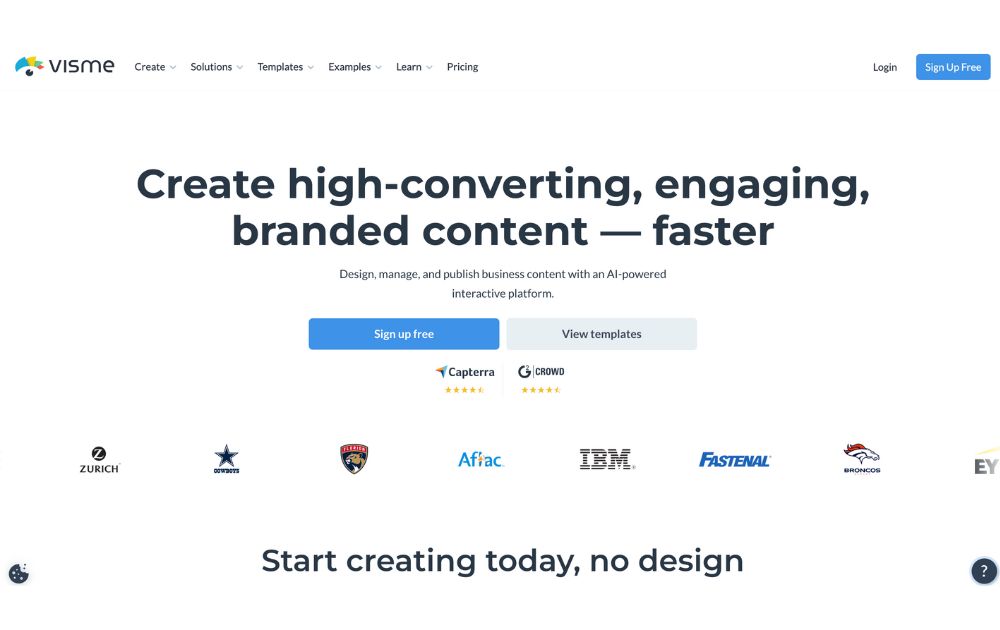
Visme is a cloud-based presentation software that enables users to create visually engaging and interactive presentations, infographics, and other visual content. Its user-friendly drag-and-drop interface makes it easy for users to add text, images, charts, and other elements to their presentations. Likewise, it offers design options like custom color schemes, fonts, and layouts. On top of that are interactive features like videos which can engage audiences and make the presentation more interactive.
Visme also offers collaboration features that allow multiple users to work on a presentation simultaneously. Users can also share it for feedback and review.
Best for: Visme is perfect for small and large businesses, marketers, project managers, content creators, and educators.
Pricing:
- Personal: $12.25/month paid annually
- Business: $24.75/month paid annually
- Enterprise: Custom
2. Prezi
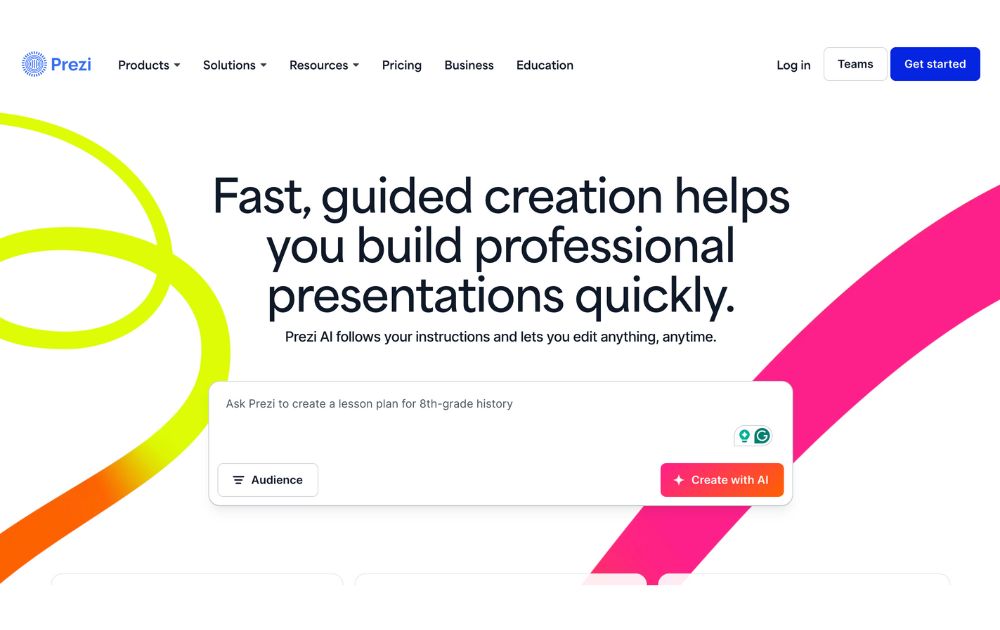
Prezi offers a great alternative to the typical presentation format that goes slide by slide. Prezi’s creative idea is to create an animated, non-sequential flow of slides with hidden topics and subtopics until you zoom in. While Prezi’s interface can be slightly complicated, it is a good option for people who want to add a creative touch to their slides.
Best for: Businesses and educators.
Pricing:
- Free plan: $0
- Plus: $15/month
- Premium: $25/month
- Teams: Starts at $39/month
3. Google Slides
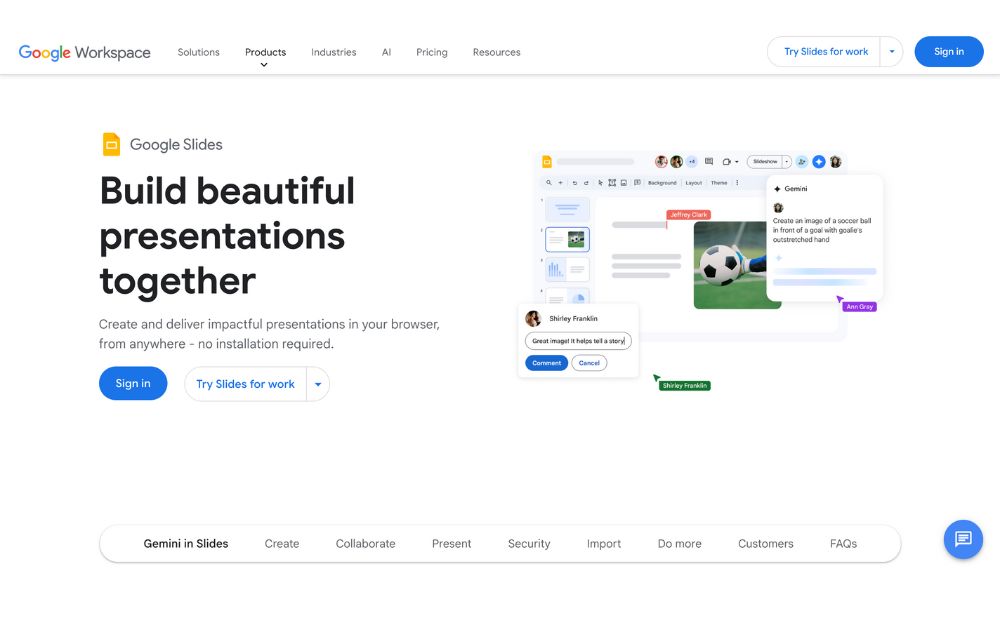
One of the most used tools online, Google Slides is a web-based presentation software part of the Google Suite of productivity tools. Google Slides is a web-based presentation software part of the Google Suite of productivity tools. It enables users to create, edit, and share presentations online, and it is similar in functionality to other presentation software such as Microsoft PowerPoint.
With Google Slides, users can create a new presentation from scratch or use one of the many templates provided by Google. Users can add text, images, charts, and other elements to their presentations using a simple drag-and-drop interface. Google Slides also offers a wide range of design options, including custom color schemes, fonts, and layouts, as well as the ability to add animations, transitions, and other effects to slides.
Best for: Business professionals, educators and students
Pricing:
- Free to use for anyone with a Google account.
- Plans for business accounts start at $6.30/user/month.
4. Keynote
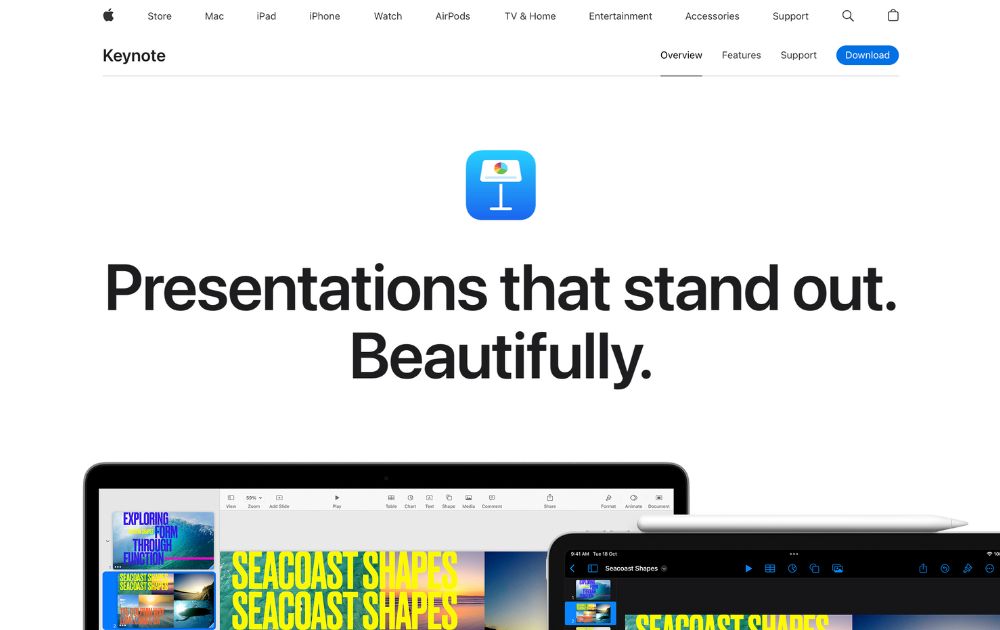
Keynote is an Apple presentation software and one of the original alternatives to Microsoft’s PowerPoint. The best thing with Keynote is that it is the most similar to PowerPoint and Google Slides.
Best for: Keynote is good for businesses, educators, and individuals.
Pricing: Free for anyone with Apple ID
5. Microsoft PowerPoint
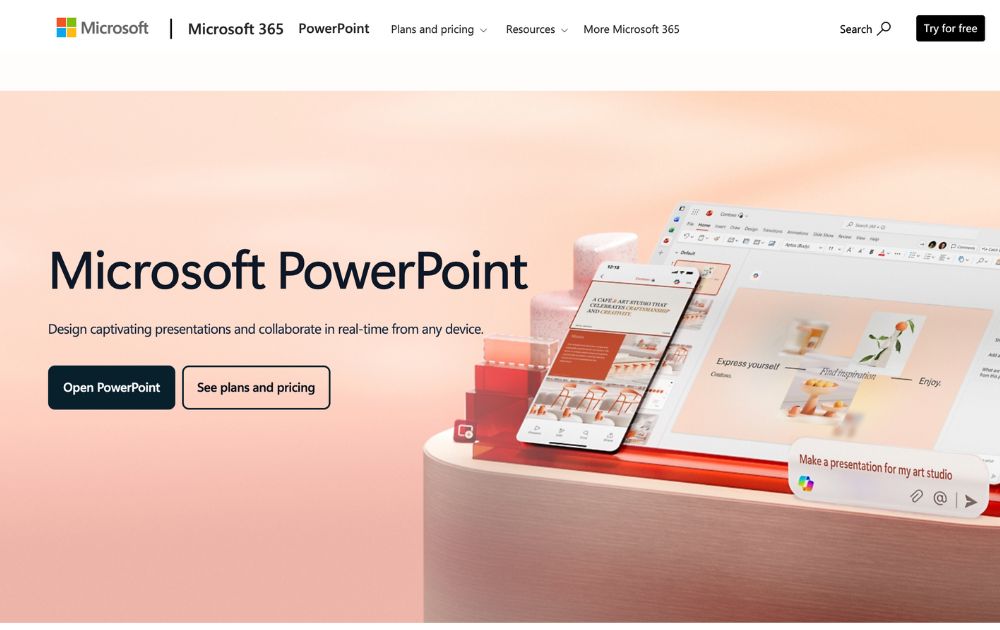
Microsoft PowerPoint is the world’s most widely used presentation software. It is similar in functionality to other presentation software such as Apple Keynote and Google Slides.
PowerPoint also offers collaboration capabilities, including sharing presentations for feedback and review. It also allows users to work on presentations with other users simultaneously. Plus, it enables users to export their presentations in PDF, PPTX, and JPG formats.
Best for: Businesses, individuals, students, teachers and individual who use a Windows PC or device.
Pricing:
- Free to download on desktop or mobile devices
- Microsoft 365 Personal starts at $9.99/month
6. Ludus

Ludus is one of the coolest presentation tools available online. The main attractions of Ludus are the clean black screen to edit on and the number of integrations that provide importing capabilities for all sorts of content.
Best for: Designers and business owners
Pricing:
- Starts at $14.90/month for teams of 1-15 people.
- Offers a 30-day free trial
7. Slides
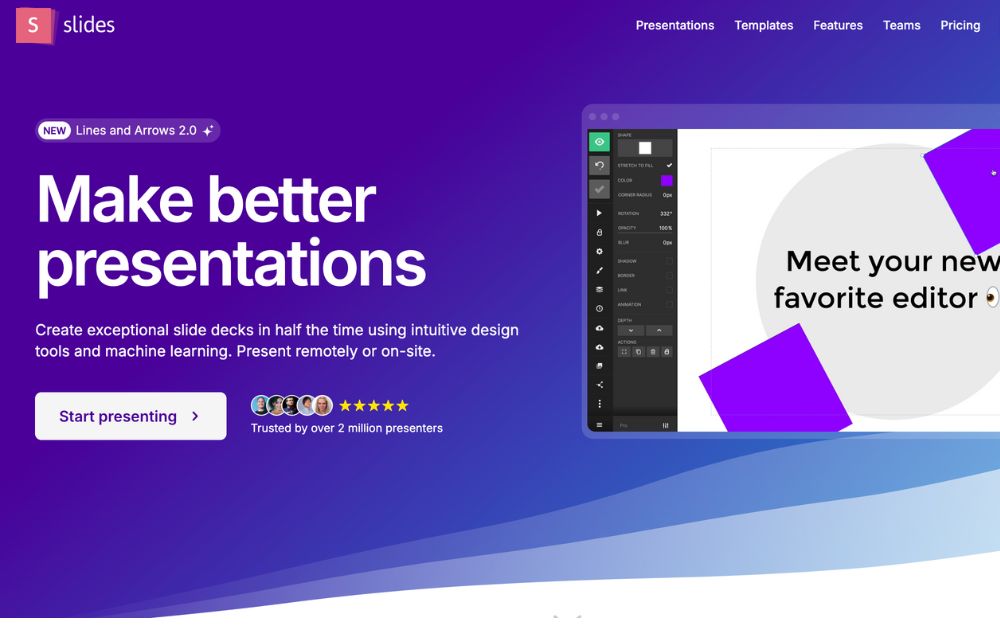
Slides promotes itself as “pixel-perfect” presentation software. Its editor includes a built-in grid to help with composition. Slides have a lower cost at the highest price tag, which suits smaller businesses.
Best for: Small business owners, startups, and individuals.
Pricing:
- Free plan
- Paid plans start at $5/month
8. Slidebean

SlideBean is a cloud-based presentation software that enables users to create visually engaging and professional presentations quickly and easily. The software is developed as user-friendly and intuitive, making it easy for users to create high-quality presentations without any design experience.
Slidebean also takes pride in its AI pitch deck creator, which offers a fast way to create a presentation.
Best for: Small businesses, startups, and entrepreneurs.
Pricing:
- Paid plans start at $12/month
9. Beautiful.ai
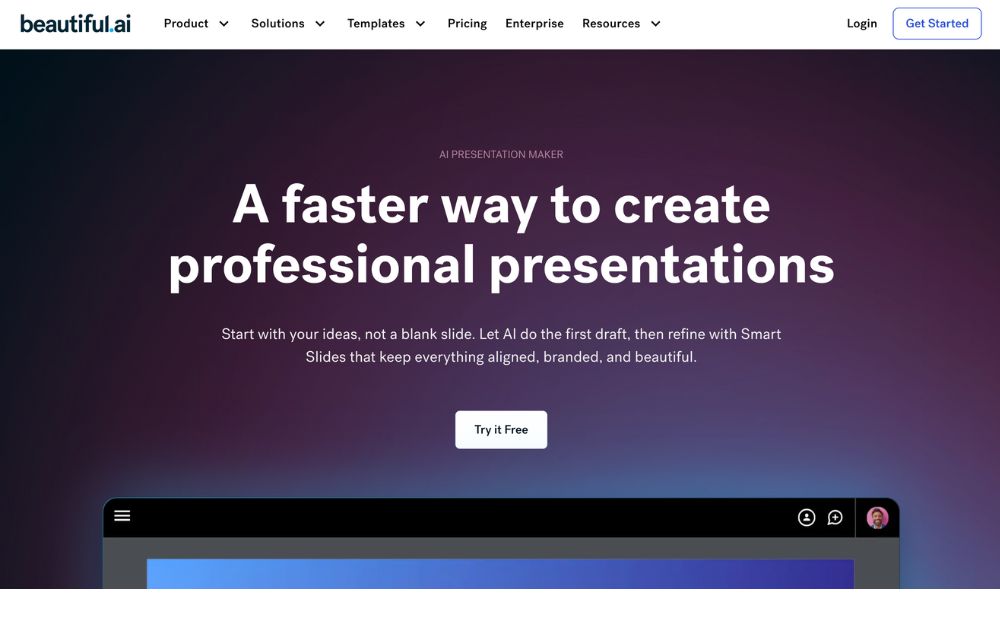
The cloud-based presentation software Beautiful.ai uses artificial intelligence to help users create visually stunning and professional-looking presentations. It has user-friendly and intuitive features, making it easy for users to create high-quality presentations without any design experience.
Best for: Beautiful.ai is a perfect tool for beginners and non-designers.
Pricing:
- Pro plan: $12/month, billed annually
- Team plan: $40/month, billed annually
- Offers a 14-day free trial
10. Zoho Show
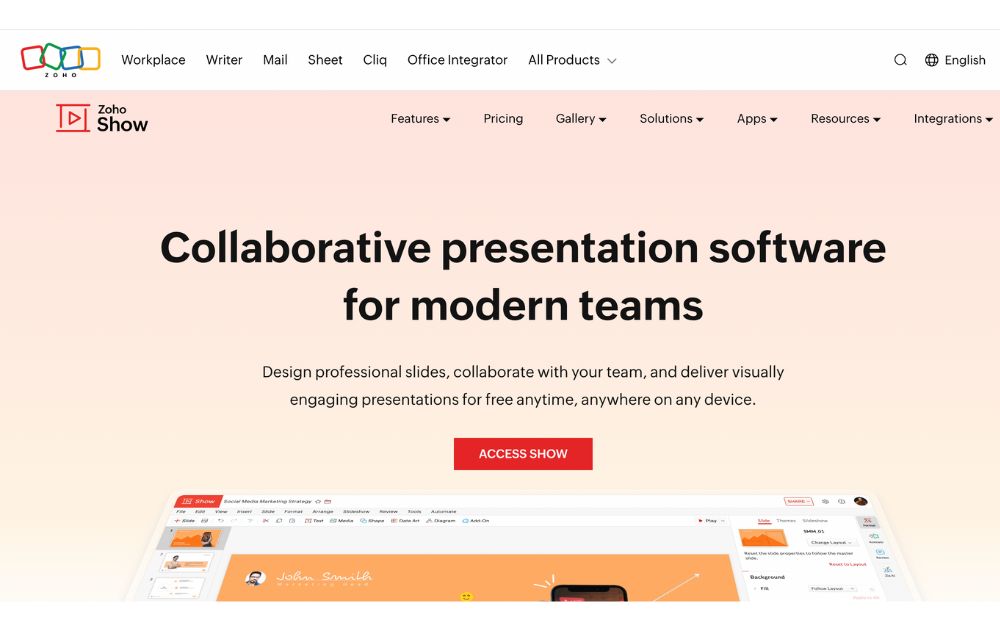
Zoho Show is a web-based presentation software developed by Zoho, a company that provides a suite of productivity and collaboration tools. It is part of the Zoho Office Suite, which also includes tools such as Zoho Writer for word processing, Zoho Sheet for spreadsheets, and Zoho Meeting for online meetings.
With Zoho Show, users can create a new presentation from scratch or use one of the many templates provided. Users can add text, images, charts, and other elements to their presentations using a simple drag-and-drop interface.
Best for: Businesses, entrepreneurs, educators, and students.
Pricing:
- Free plan: up to 5 users
- Paid plans start from $2.5/user/month, paid annually
The Lowdown
Presentation software is the most common tool used to pitch an idea to investors and present proposals to prospective clients. Likewise, it is utilized by many organizations to introduce new products or services, train staff on new policies, or teach students new or complex concepts. The collection of the best presentation software will help broaden your choices regarding the tools that will improve your productivity.
Featured Image Credit: Photo by RDNE Stock project from Pexels
Technology
Top 10 Social Media Scheduler Apps to Automate Your Postings
Published
5 days agoon
December 11, 2025By
Skylar Lee
Social media managers have a lot on their plates. Creating, scheduling, and publishing posts can take up a huge chunk of their time. Fortunately, there are social media schedulers that can make your life easy. Here is our list of the 10 best:
Best Time and Day to Post on Social Media
Before we discuss the top 10 social media scheduling apps, you might wonder what the best time is to post on social media. Search Engine Journal and Sprout Social report that the best days to do it are Tuesday through Thursday. Meanwhile, the best time to post it is from 9 AM to 10 AM on those days. Avoid posting on Sundays.
But should you follow this?
The thing is, you don’t have to follow this social media best practice. One way to determine the best day and time to post for your business is through testing. For example, you can post at 2 PM ET for two weeks. Then, you can run a new test by switching to 3 PM after two weeks.
Now, let’s hop into the top 10 social media scheduler apps you can try.
1. Buffer

Buffer is an all-in-one social media management tool. Beyond being a social media scheduling tool, it can help you level up your social media marketing. You can add the first comment on your Instagram post and drive more traffic to your website. Aside from that, you have control before publishing your TikTok posts. Buffer will send you a notification, and you can approve the post before it goes out.
Pricing:
- Free
- Essentials – $6/mo/channel
- Team – $12/mo/channel
2. Hootsuite
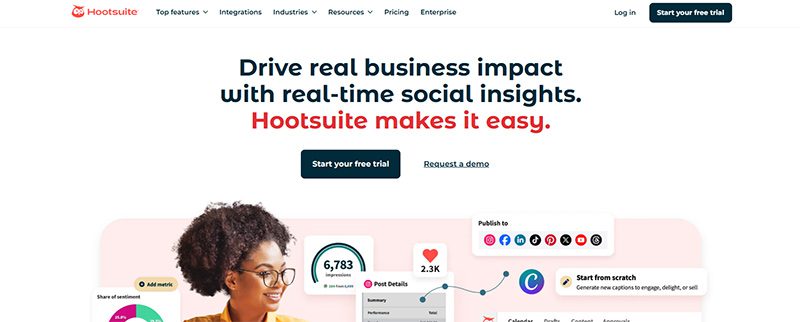
Hootsuite has been a well-known social media scheduler since the early 2010s. And the social media management tool is still the leading choice for 200,000+ businesses worldwide. Once you subscribe to Hootsuite, you can access its Hootsuite Planner. This enables you to schedule posts at any time. Plus, you can publish bulk posts on different social media channels, such as Facebook, Instagram, Twitter, and LinkedIn.
Pricing:
- Standard – $149/user/mo
- Advanced – $399/user/mo
- Enterprise – Contact sales
3. Agorapulse
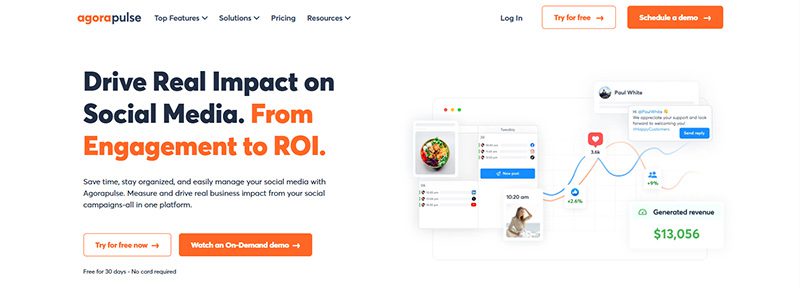
If you need a collaborative social media scheduler, Agorapulse is one of the best options for your team. Team members can approve, reject, and leave feedback on draft posts before scheduling them. And if you manage different brands, you can organize and store files in folders. Aside from that, they have a rescheduling feature. This allows you to republish an old post and promote it again on your social media channels. Plus, if you’re on the go, they have an app too!
Pricing:
- Standard – $99/user/mo
- Professional – $149/user/mo
- Advanced – $199/user/mo
- Custom – Contact sales
4. SocialPilot
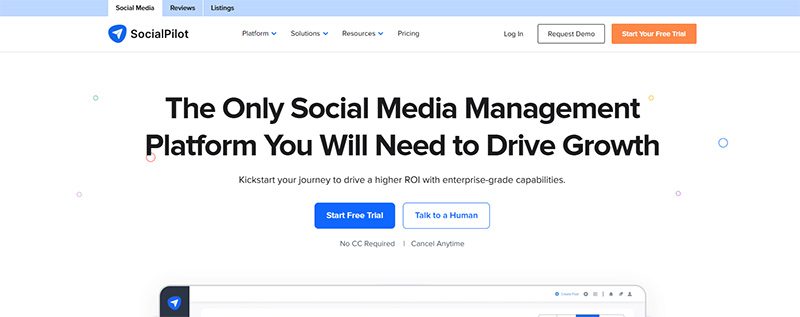
If you want an all-around social media scheduler, SocialPilot should be one of your top choices. You can publish posts on the following platforms:
- TikTok
- YouTube
- Google Business Profile
Aside from that, you can publish 500 posts in one go! You don’t have to worry about posting every week or month. You can be ahead and save time to do other tasks!
Pricing:
- Essentials – $30/mo
- Standard – $50/mo
- Premium – $100/mo
- Ultimate – $200/mo
- Enterprise – Contact sales
5. Sprout Social
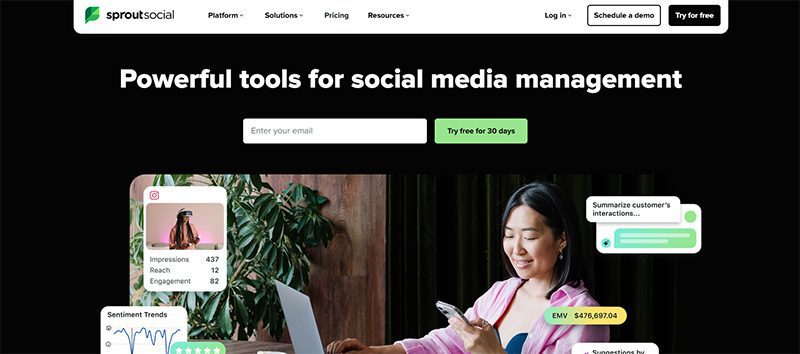
eCommerce businesses and agencies will benefit from using Sprout Social. For eCommerce businesses, they can integrate Shopify and Facebook Shops into Sprout Social. You can share your assets seamlessly on Sprout Social.
Meanwhile, agencies can benefit from Sprout Social’s asset library and message-approval workflows. This allows collaboration between your teams and clients.
Another useful feature of Sprout Social is content suggestions. If you run out of inspiration, Sprout Social can provide post ideas to help you create engaging content.
Pricing:
- Standard – $199/per seat/mo
- Professional – $299/per seat/mo
- Advanced – $399/per seat/mo
- Enterprise – Request a demo
6. MeetEdgar
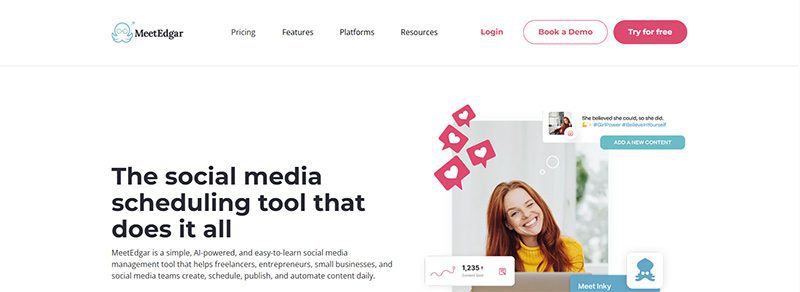
If you want to organize your social media posts according to categories, MeetEdgar should be one of your top choices. The platform allows you to create “Categories.” This enables you to organize the content you want to share on a specific social media platform. Aside from that feature, you can also easily upload your assets to your library and import content. Finally, get an overview of your postings for the next two weeks and review them before they’re published!
Pricing:
- Eddie – $29.99/mo
- Edgar – $49.99/mo
7. SocialBee
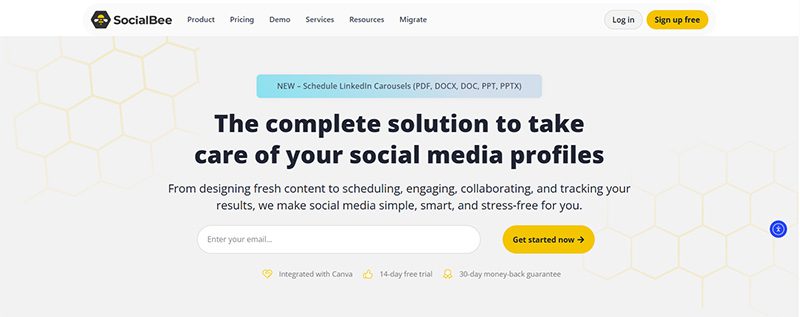
SocialBee is an excellent choice for social media experts who need more control over scheduling and publishing. You can choose to publish your content on ALL active social media platforms or select channels. Plus, SocialBee has a recurring schedule feature where you can repost old content at a later time. However, you can reverse the recurring feature by “expiring” a post. You can stop it when it reaches a number of shares or after a certain time.
Pricing (Standard):
- Bootstrap – $29/mo
- Accelerate – $49/mo
- Pro – $99/mo
Pricing (Agency):
- Pro50 – $179/mo
- Pro100 – $329/mo
- Pro150 – $449/mo
8. Later

Does your business love reposting user-generated content? Later is the best option for your business. You can follow a hashtag on the dashboard and share the post immediately on your social media channels. When uploading assets, you can use the library or connect your Google Drive or Dropbox account for seamless uploads. Finally, you can download their Chrome extension for faster sharing of images to share on your social media accounts.
Pricing:
- Starter – $25/mo
- Growth – $50/mo
- Scale – $110/mo
9. Pallyy
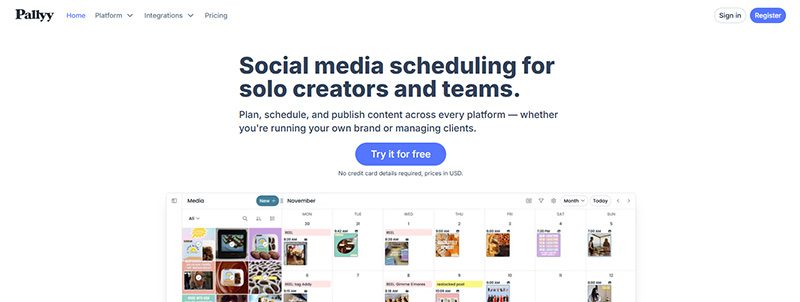
If you run an agency and need a social media scheduling tool, you should consider Pallyy as your primary social media management tool. You can create brand folders to organize posts. You can also select what post you’re publishing on the dashboard. Plus, it’s easy to collaborate with team members and leave drafts for next time. With Pallyy, you can post on popular social media sites like Facebook, Twitter, Instagram, and TikTok.
Pricing:
- Starter – $15/mo
- Pro – $25/mo
- Agency – $99/mo
- Scale – $199/mo
10. Planable
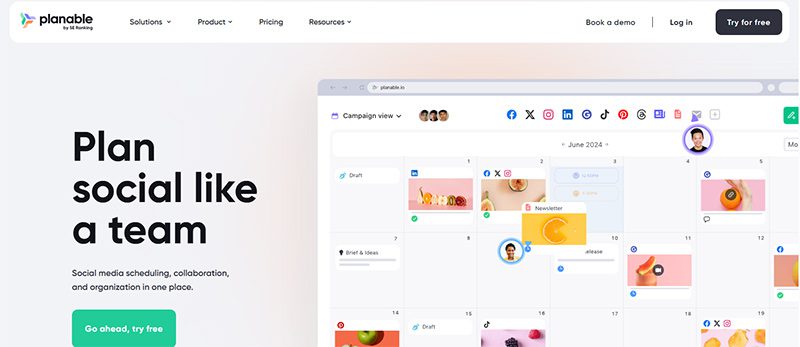
Planable is another social media scheduler focused on team collaboration. Before a team member schedules or publishes a post, other team members can chime in with feedback. Plus, like most apps on this list, you can preview a post before publishing it to your social media channels. Many businesses that use this app have saved time by scheduling multiple posts to various channels.
Pricing:
- Free
- Basic – $39/workspace/mo
- Pro – $59/workspace/mo
- Enterprise – Contact sales

What’s the Best Design Agency in Chicago
Casino ohne 5 sekunden regel paysafe
Casino 400
888 casino willkommensbonus
Cadoola casino review
BDMBet Sito web ufficiale 450 di bonus + 250 giri gratis
Built for long-term growth, Pinco Casino secures its dominance through the 2025–2026 evolution

Top 10 Presentation Software To Use in 2026

10 Best Startup Software for 2026 Every New Business Should Use

Top 10 Social Media Scheduler Apps to Automate Your Postings

How Marketing Optimization Tools Level Up Your Marketing Game

What’s the Best Graphic Design Service for Fast Turnaround

What are the Best Kimp Alternatives?

What’s the Best Unlimited Graphic Design Subscription Platform?
Trending
- Business5 days ago
How Marketing Optimization Tools Level Up Your Marketing Game
- Uncategorized3 days ago
Built for long-term growth, Pinco Casino secures its dominance through the 2025–2026 evolution
- Uncategorized2 days ago
BDMBet Sito web ufficiale 450 di bonus + 250 giri gratis
- Business28 minutes ago
What’s the Best Design Agency in Chicago
- cresuscasino14 hours ago
Cadoola casino review
- cresuscasino5 hours ago
Casino 400
- azurcasino10 hours ago
888 casino willkommensbonus
- Uncategorized2 hours ago
Casino ohne 5 sekunden regel paysafe


